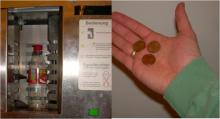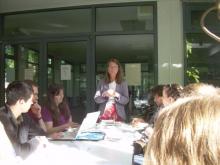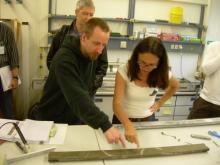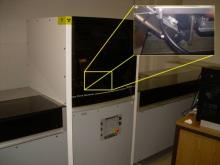What Are They Doing?
An international team of researchers from the United States, Germany, Russia, and Austria traveled to northeast Russia to conduct a large-scale scientific drilling project in Lake El'gygytgyn (pronounced el'geegitgin), a crater lake created 3.6 million years ago by the impact of a meteorite measuring about 18 km in diameter. The team worked on the lake ice throughout the winter, using a customized light-weight drill rig to obtain drill cores of layered muds from two sites in the lake.
Lake El'gygytgyn possesses a unique record of prehistoric climate change in the arctic. Because this basin was never glaciated, an uninterrupted sediment sequence of nearly 400 m (1312 feet) has accumulated at the bottom of the lake. Sediment cores collected during this expedition were used to gather information about the history of the basin and were compared with similar paleoclimate records from other parts of the world, helping researchers to better understand the arctic's role in global climate change.
The team also drilled a short distance into the highly fractured rock layer below the sediments to learn more about meteorite impacts. Because of the particularly well-preserved rock structure in Lake El'gygytgyn, the team was able to learn how igneous target rocks in this area responded to impacts, potentially providing the basis for important understanding related to cratering processes on Mars.
Geologists used the data collected from the project to reconstruct past climate records on longer time scales, improve understanding of the climate system, and better inform scientists who predict future climate change.
Where Are They?
Lake El'gygytgyn (pronounced el'geegitgin) is located 100 km (62 miles) north of the Arctic Circle and 250 km (155 miles) inland from the Arctic Ocean (67.5° N and 172° E) on the remote Chukchi Peninsula in the Russian Far East. This large lake measures 12 km (7.5 miles) wide and roughly 170 m (558 feet) deep. It is positioned on the continental divide between the Arctic Ocean and the Bering Sea in the middle of Anadyr Mountains. The team lived and worked out of a temporary camp located on the west shore of the frozen lake ice.
Latest Journals

Dr. Brigham-Grette's research interests are focused on the stratigraphy, sedimentology, and chronology of geologic systems that record the climate evolution and sea level history of the Arctic since the Pliocene. Most of her research program is aimed at documenting the global context of paleoenvironmental change across "Beringia", i.e., the Bering Land Bridge, stretching across the western Arctic from Alaska and the Yukon into NE Russia including the adjacent marginal seas. Starting in the 1980s with fieldwork on the sea level history and glacial stratigraphy of vast Arctic coastal plains and coastal environments in comparison with regional alpine glaciation, she is now focused on the integration of records from marine and lake systems.
Since 1991, her group has participated in numerous field expeditions to remote regions of Arctic Russia and she was co-chief scientist in 2002 of an expedition on the U.S. Coast Guard icebreaker Healy, taking sediment cores from the Bering and Chukchi Seas. She is the US Chief Scientist of the El'gygytgyn Lake Scientific Drilling project, a multinational field program leading to the first unprecedented recovery in 2009 of a 3.6 Myr record of terrestrial paleoclimate. She has previously been involved in the IPY STEM Polar Connections project to integrate the study of polar regions and International Polar Year activities into the middle and high school curriculum from the terrestrial Arctic.





